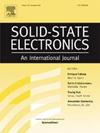低温下工业28nm FD-SOI相变存储器的初步结果
IF 1.4
4区 物理与天体物理
Q3 ENGINEERING, ELECTRICAL & ELECTRONIC
引用次数: 0
摘要
本文报道了在室温(RT)和低温(CT)下编程的完全共集成28 nm FD-SOI UTBB相变存储器(PCM)的新初步结果。PCM是一种锗、锑、碲(GST)化合物类型,与环境温度相比,它在77K下具有多态开关功能,没有额外的操作要求。由于相变存储器依赖于温度,因此在对脉冲进行编程以估计漂移系数后,还进行了漂移测试,以跟踪电阻随时间的变化。一个有趣的特点是,使用相同的编程偏置条件,在77K时,漂移系数降低了三倍,离子/离合比有所改善。这些结果非常令人鼓舞,并为PCM在高温(例如汽车)和极低温(例如空间,量子)的应用打开了大门。本文章由计算机程序翻译,如有差异,请以英文原文为准。
Preliminary results on industrial 28nm FD-SOI phase change memory at cryogenic temperature
This study reports new preliminary results on fully co-integrated 28 nm FD-SOI UTBB phase change memories (PCM) programmed at room temperature (RT) and cryogenic temperature (CT). The PCM is a germanium, antimony, tellurium (GST) compound type which is found to be functional at 77K with multi-state switching without additional operating requirements compared to the ambient temperature. As the phase change memory is temperature dependent, drift tests are also performed to track the change in resistance over time after programming the pulses to estimate drift coefficients. An interesting feature is that using the same programming bias conditions, the drift coefficient is three times lower at 77K with an improvement in the Ion/Ioff ratio. These results are very encouraging and open the door to the PCM in applications both at high temperatures (e.g. automotive) and at very low temperatures (e.g. space, quantum).
求助全文
通过发布文献求助,成功后即可免费获取论文全文。
去求助
来源期刊

Solid-state Electronics
物理-工程:电子与电气
CiteScore
3.00
自引率
5.90%
发文量
212
审稿时长
3 months
期刊介绍:
It is the aim of this journal to bring together in one publication outstanding papers reporting new and original work in the following areas: (1) applications of solid-state physics and technology to electronics and optoelectronics, including theory and device design; (2) optical, electrical, morphological characterization techniques and parameter extraction of devices; (3) fabrication of semiconductor devices, and also device-related materials growth, measurement and evaluation; (4) the physics and modeling of submicron and nanoscale microelectronic and optoelectronic devices, including processing, measurement, and performance evaluation; (5) applications of numerical methods to the modeling and simulation of solid-state devices and processes; and (6) nanoscale electronic and optoelectronic devices, photovoltaics, sensors, and MEMS based on semiconductor and alternative electronic materials; (7) synthesis and electrooptical properties of materials for novel devices.
 求助内容:
求助内容: 应助结果提醒方式:
应助结果提醒方式:


